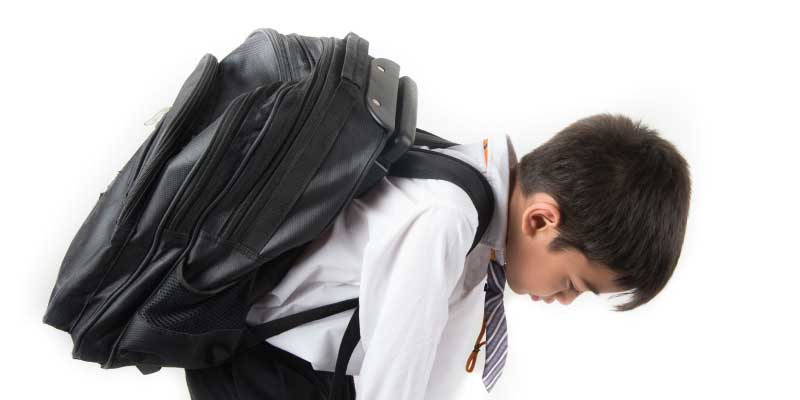The critical truth of backpacks on posture
When we think of backpacks, our minds conjure up images of busy school days, children, or perhaps a camping adventure. Few among us think about posture, and the devastating effects backpacks can cause on the back, neck, and shoulders of those who carry them. If you’re a mother of a school age child, seeing your child slumped under a huge load of books may slip under your radar as normal—but it’s something you should really pay attention to.

Kids often carry very heavy loads back and forth to school on their backs. A typical backpack filled with textbooks and other school essentials can weigh more than 30% of the weight of the child who is carrying them. (1) This doesn’t just mean sore backs and shoulders the next day. It can cause poor posture, compressed discs in the spine, and even curvature of the spine.
Straps digging into the muscles of the shoulder were also found not just to irritate the area, but to cause potential damage to the nerves of the hands and arms. These issues aren’t just small problems. They are serious health dangers that could cause disability later in life.
The recommended safety load is between 10-15% of the person carrying the load’s weight. (2) When carrying more than 20%, children reported serious back and neck pain far in excess of what children carrying lighter loads had.
Protecting a child’s back is one of the most important things you can do every day for their health. Teaching good posture helps, but only if your child can maintain that posture with the backpack on. This means first of all, lightening their load. If the load they are carrying is too much, ask to leave the textbooks at school, or to use a rolling bag instead to preserve delicate, growing, joints.
Backpacks should also be fitted correctly. A backpack that fits snugly will cause less pressure to the spine and shoulders, and will help the child use better posture while wearing the backpack.
If you notice your child complaining of back pain, walking with poor posture, or that their bag is unusually heavy, it’s important for parents to get their children’s back examined by a professional. Damage done on a developing spine can be permanent, and cause pain and disability long into adulthood. A quick check by a chiropractor now could save your child from a lifetime of problems later.
Children of course, aren’t the only ones who suffer from pain and poor posture caused by backpacks. Adults often have these problems too, although the bag is more likely to be an overstuffed purse or laptop case rather than a backpack. These bags are often even worse than the backpacks, because they are typically used only on one side of the body, straining the muscles in order to achieve balance.
In order to save your backs, necks, and shoulders, it is important to use correct posture while carrying a bag, regardless of your age. If you start to suffer pain, or hear a child complain of pain, it’s important to take the complaints seriously. A chiropractor can often ease the problems caused by backpacks, and help show you how to hold yourself correctly to avoid causing farther injury.
Backpacks can do a number on our bodies, but only if we let them. Keep loads light, carry yourself well, and avoid heavy weights slung to one side of the body in order to save yourself from severe injury that may not be repairable. Your body will thank you for taking the best possible care of it. If you’re not sure if wearing a backpack or heavy purse has caused damage, ask your chiropractor to examine your back. The sooner you learn about problems, the sooner they can be fixed. This applies to children with heavy backpacks especially, as they may not be aware of the damage they are causing their backs.
For more information, or for a personal assessment for you and/or your child, contact the experts at All Health Chiropractic today, here.
Resources:
https://www.nbcnews.com/better/health/why-bags-are-wrecking-our-backs-ncna803541

